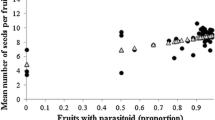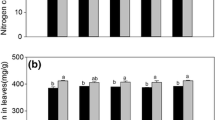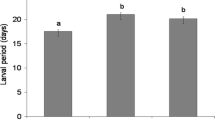Abstract
The effects of root herbivory on a tephritid seed predator (Terellia ruficauda) and its parasitoids were investigated. Soil fauna were manipulated by insecticide treatment; host plant (Cirsium palustre) phenology and the oviposition behaviour of both tephritid and parasitoids (Pteromalus elevatus and Torymus chloromerus) recorded. Although insecticide-treated (and hence reduced root herbivory) plants had larger flowerheads, population abundances of both tephritids and parasitoids were greater on thistle plants subjected to root herbivory. Percentage parasitism was similar in both treatments. Root herbivory is thought to enhance the nutrient quality of plants and this may have resulted in the tephritid preferentially feeding on thistles whose roots had been attacked. Parasitoids on these plants were probably affected by a combination of increased plant attractivity (as for the tephritids), smaller flowerheads aiding ovipositor entry and more tephritid hosts being present. This is the first study to show that root herbivores, through plant-mediated interactions, can affect seed herbivores and also, albeit indirectly through the host, natural enemy trophic levels.
Similar content being viewed by others
Author information
Authors and Affiliations
Additional information
Electronic Publication
Rights and permissions
About this article
Cite this article
Masters, G.J., Jones, T.H. & Rogers, M. Host-plant mediated effects of root herbivory on insect seed predators and their parasitoids. Oecologia 127, 246–250 (2001). https://doi.org/10.1007/s004420000569
Received:
Accepted:
Published:
Issue Date:
DOI: https://doi.org/10.1007/s004420000569




